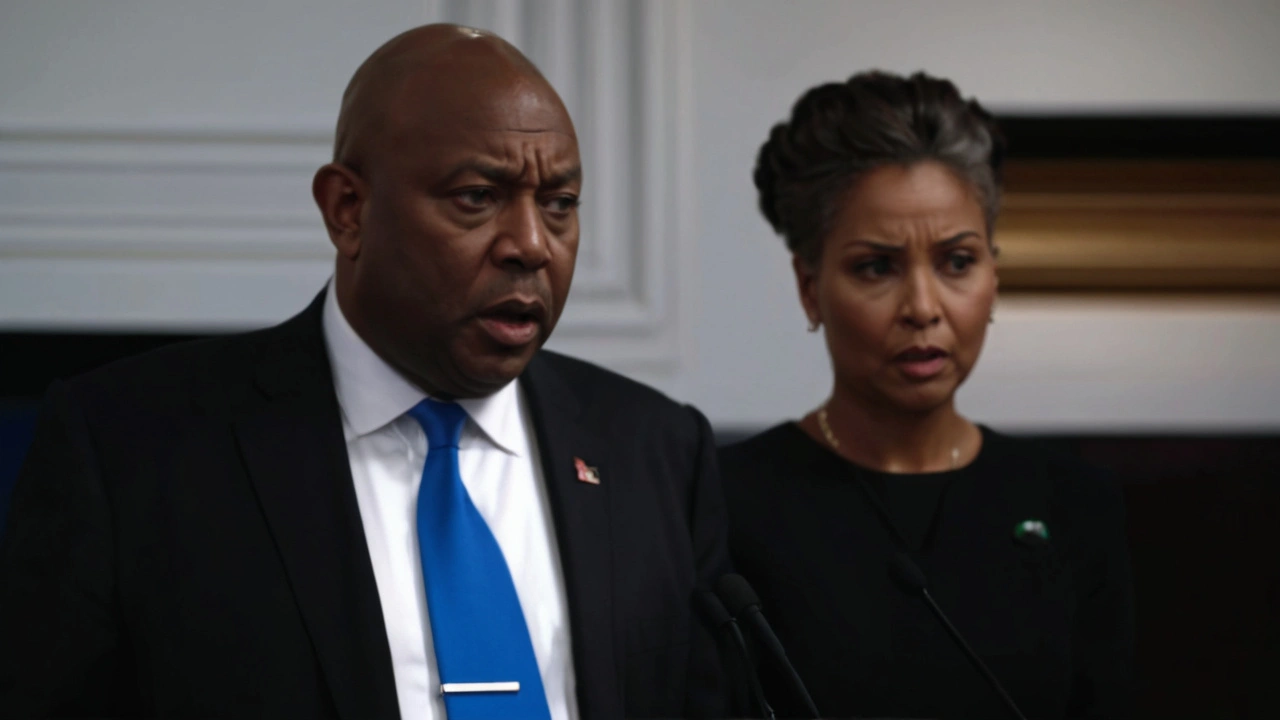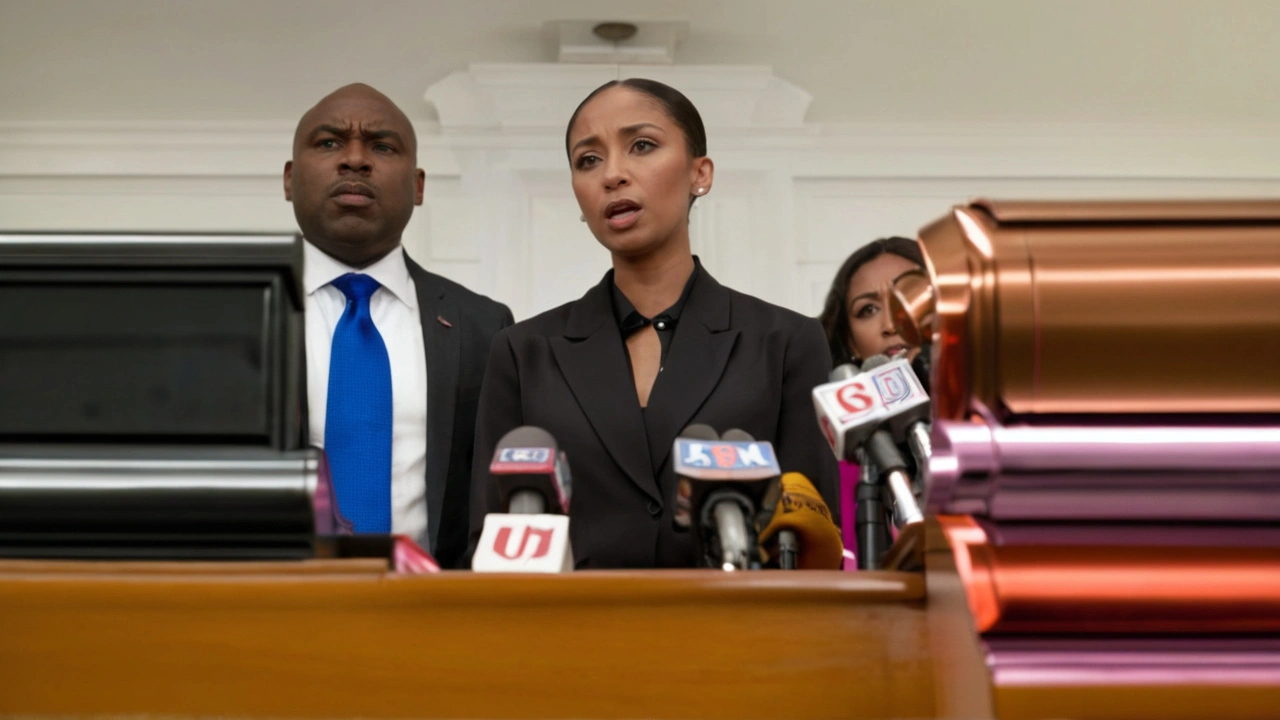The recent fatal shooting of Sonya Massey, a 36-year-old Black mother, by a White sheriff’s deputy in Illinois has ignited a wave of outrage and protests across the country. Massey was shot on July 6 after she had dialed 911, expressing concerns about what she believed to be a potential intruder outside her home. The incident has since drawn parallels to other tragic high-profile cases of police violence against Black women, such as Sandra Bland and Breonna Taylor, and has reinvigorated the #SayHerName movement.
The Incident That Changed Everything
On the night of July 6, Sonya Massey, worried about her safety, decided to call 911 to report a potential intruder outside her Illinois home. When deputies from the Sangamon County Sheriff’s Office arrived, they initially appeared to be responding to a routine distress call. However, as body camera footage reveals, the situation quickly escalated. The video shows the deputies knocking on Massey's door and shouting for her to come out, creating a tense atmosphere.
Eventually, the deputies entered Massey's home and asked her to check on a pot of hot water boiling on the stove. What transpired next remains shrouded in ambiguity, but shortly after, Deputy Sean Grayson fatally shot Massey. The exact circumstances leading to the shooting are unclear, even as the body camera footage captures the crucial moments. This lack of clarity has incited widespread condemnation and urgent calls for transparency and accountability.
A Nation Stunned and Outraged
The shooting has sent shockwaves across the nation, eliciting reactions from politicians, activists, and everyday citizens. President Joe Biden released a statement condemning the act and underscoring the urgent need for justice for Massey's family. He emphasized the critical importance of addressing deeply entrenched issues of police misconduct and systemic racism in the policing system.
Public sentiment echoes a collective weariness and fury over relentless instances of police brutality, particularly against Black women. For too long, their stories have often been overshadowed or neglected in broader conversations about police violence. This case has thrust the specific challenges faced by Black women into the public consciousness, compelling society to confront the nuanced dimensions of racial and gendered violence.
Historical Parallels and the #SayHerName Movement
Sonya Massey's tragic death resonates deeply within the context of a broader historical pattern of police violence against Black women. The recent memory of cases like those of Sandra Bland and Breonna Taylor forms a painful continuum of grief and anger. The #SayHerName movement, which seeks to highlight the experiences of Black women who have been victims of police violence, has found renewed momentum. Activists assert that systemic reforms are paramount to address the intersecting oppressions faced by Black women in encounters with law enforcement.
Call for Systemic Change and Accountability
In the wake of Massey's death, her family has emerged as staunch advocates for comprehensive policing reforms. They are calling for the passage of the George Floyd Justice in Policing Act, a proposed legislation that aims to rectify policing practices marred by misconduct and excessive force. The bill includes measures to establish national standards for police conduct, create a national database to track officers with a history of misconduct, and promote the use of body cameras, among other key provisions.
For Massey's family and the broader community, these reforms are not merely about policy changes but are deeply rooted in the need for transformative justice. They argue that true accountability would ensure that no other family has to endure similar heartbreak. The call for reform is intertwined with a demand for cultural shifts within law enforcement that prioritize de-escalation, empathy, and respect for human dignity.
Repercussions and Legal Proceedings
As the legal process unfolds, Deputy Sean Grayson, the officer involved in Massey's shooting, has been charged with murder. This development marks a significant step toward accountability, but many view it as only a partial measure of justice. For activists and the public alike, the legal proceedings are being closely monitored, with an insistence that the justice system must deliver a fair and unbiased adjudication.
The broader implications of this tragic incident underscore the urgent necessity of confronting structural inequities within the criminal justice system. The Massey case is emblematic of the challenges faced in achieving substantial reforms that can address the root causes of police violence and racial bias inherent in policing practices.
A Broader Reflection on Race and Policing
In reflecting on the broader societal impact of this incident, it is evident that conversations about race and policing have entered a deeper phase of national introspection. The intersectionality of race, gender, and policing is now more pronounced in the public discourse, demanding nuanced understanding and responses. There is a growing recognition that addressing police violence requires dismantling the broader structures of systemic racism that pervade various facets of American life.
Activists and community leaders emphasize the importance of grassroots mobilization, public education, and legislative advocacy to create sustained changes. They highlight that the path to justice is multifaceted, encompassing both immediate legal accountability and long-term societal transformation. The end goal is to build communities where all individuals, regardless of race or gender, can feel safe and respected in their interactions with law enforcement.

The Road Ahead
As the nation grapples with the aftermath of Sonya Massey's death, there is a palpable sense of urgency to confront the systemic issues illuminated by her case. The calls for justice echo loudly, resonating with a collective yearning for a society that upholds the dignity and worth of every individual. The tragic loss of Massey has become a catalyst for renewed activism, prompting a reevaluation of what true justice and equity should look like in policing and beyond.
The road ahead is undoubtedly complex, necessitating concerted efforts from policymakers, law enforcement agencies, and communities to effect meaningful change. The discourse sparked by Massey's case reflects a broader commitment to dismantle entrenched injustices and build a more just and equitable future for all.




Reading about Sonya Massey's tragedy feels like staring into a mirror that reflects the collective conscience of a nation. We often talk about justice in abstract terms, yet each story forces us to confront the lived reality of fear and loss. The pattern repeats, and with each repetition the moral imperative grows louder, demanding not just reform but a fundamental shift in how we view protection and humanity. It is not enough to sigh at headlines; we must translate outrage into sustained, concrete action that redefines accountability. In the end, the hope we cling to is that the next generation will inherit a system that truly safeguards every mother, every child, every individual.
The entire episode is a textbook example of the hidden machinations that pervade our so‑called law‑enforcement institutions. One cannot ignore the subtle cues that point to a coordinated narrative designed to silence dissent and maintain the status quo. The deputy’s actions, as captured on camera, reveal an unsettling choreography that seems rehearsed, almost theatrical in its execution. It is as if the state itself has scripted this tragedy to perpetuate a myth of order while the undercurrents of oppression continue unabated. Remember, the deeper the cover‑up, the louder the truth eventually reverberates.
Hey folks 😊, this is heart‑wrenching but also a call to channel our collective energy into positive change 💪. Let’s keep the momentum alive by supporting local organizations that are pushing for body‑camera transparency and community policing reforms. Every voice matters, and together we can build a future where stories like Sonya’s become relics of the past. Stay strong, stay unified! 🌟
That drama is just insane the way they spin these things like a circus the media loves it and we keep watching like its some sitcom but the truth is folks the system is broken and we need real change not just talk i dont see any real solutions here and the whole thing feels like a script
It is incumbent upon every patriotic citizen to demand that those entrusted with safeguarding our communities are held to the highest standards of conduct. The unchecked use of lethal force not only tarnishes the reputation of law enforcement but also undermines the foundational principles upon which our nation stands. I urge my fellow countrymen to support legislative measures that enforce transparency, accountability, and rigorous training. Only then can we preserve the integrity of our institutions while honoring the memory of victims like Sonya Massey.
I feel the same way as the person above – we should all stand together and push for calm, respectful dialogue. It’s important to listen, learn, and help each other without getting into heated fights.
Indeed, the loss of Sonya Massey serves as a stark reminder that systemic inequities persist in our law‑enforcement frameworks; consequently, it compels us to scrutinize the underlying mechanisms that enable such tragedies. The confluence of race, gender, and power dynamics creates a vortex of oppression that is rarely addressed in mainstream discourse, yet it is precisely this intersectionality that amplifies the urgency for reform. Moreover, the historical continuum-from Sandra Bland to Breonna Taylor-reveals a pattern that cannot be dismissed as mere coincidence; it is indicative of structural deficiencies embedded within institutional policies. To remedy this, we must advocate for concrete legislative actions, such as the implementation of a comprehensive national database tracking officer misconduct, mandatory de‑escalation training, and the universal adoption of body‑camera technology. Furthermore, community‑led oversight committees should be empowered to conduct independent investigations, thereby ensuring that transparency is not merely rhetorical but operational. By fostering an environment where accountability is codified, we not only honor the memory of those lost but also fortify the public’s trust in the very institutions that are meant to protect them. In addition, cultivating cultural competence within policing agencies can mitigate biases that often precipitate unnecessary use of force. Education programs that emphasize empathy, active listening, and conflict resolution are essential components of this transformative agenda. It is also incumbent upon the legislative branch to allocate sufficient funding for these initiatives, as under‑resourced departments are more likely to resort to punitive measures rather than preventative strategies. The synergy of policy, training, and community partnership forms the bedrock of sustainable change; therefore, each stakeholder must embrace their respective responsibilities with unwavering commitment. Ultimately, the path forward demands collective perseverance, continuous dialogue, and an unrelenting pursuit of justice that transcends partisan divides. Only through such a holistic approach can we aspire to a future where incidents like Sonya’s are consigned to history, serving as solemn lessons rather than recurring headlines.
While many are quick to label this as another isolated incident, a deeper analytical lens reveals systemic flaws that have been meticulously cultivated over decades. The lack of transparent investigative protocols, combined with a culture of impunity, creates fertile ground for repeated misconduct. It's not merely about one bad officer; it's about an entire framework that needs overhaul.
We need to bring more voice from the community into the conversation, especially from folks who have historically been left out of the dialogue. The stories of Black women like Sonya not only show the gap in our justice system but also highlight the resilience and solidarity that can drive real change. It's vital we amplify those narratives, despite any occasional typos here and there, because the message is what truly counts.
Another tragedy, another call for reform.
Reading the long analysis above really puts things into perspective. It’s a lot to take in, but it underscores how every single of us can contribute-whether by sharing information, attending local meetings, or simply staying informed. Let’s keep the conversation going and turn our shared grief into collective action.